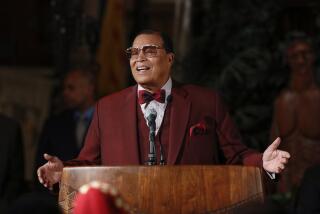Bates on Farrakhan
- Share via
At a time when Louis Farrakhan is steadily escalating his racist rhetoric, Karen Grigsby Bates calls the Nation of Islam leader a “creation of American racism” and says, “If race were not an ongoing problem, he wouldn’t exist” (Commentary, March 11). It’s a nice touch to describe Farrakhan not as a producer of racism but as its creation. But in justifying or excusing Farrakhan’s bigotry because it constitutes only a small portion of a generally positive program, Bates opens the door to other bigots who may have a cause. Whatever became of condemning bigotry because it is wrong?
Bates applauds Farrakhan’s “efforts to make black neighborhoods safer” while “lament(ing) the parts of him that are anti-Semitic.” Bates’ applause was echoed in the thousands of votes David Duke received for speaking to issues of white alienation. In suggesting that the public should overlook or ignore the incendiary racism and anti-Semitic scapegoating that are an inseparable part of Farrakhan’s message, Bates seems to suggest that Farrakhan’s bigotry is deserving of special consideration. Is she concerned that criticism of Farrakhan’s anti-Semitism will subvert his efforts “to persuade young men dangling on the precipice of self-destruction to commit themselves to a communal good”?
It is shameful that Bates can only “lament” and not condemn when Farrakhan engages in anti-Semitism and attacks “degenerate gays,” white “devils,” etc. Months ago, Farrakhan’s apologists claimed he was moderating his message and becoming more tolerant. No such claims have been made, however, since he televised his Jewish conspiracy theories just last month. Now his defenders acknowledge his bigotry, but take issue with those who would remember that the civil rights struggle was based upon speaking out against bigotry without temporizing.
JERRY SHAPIRO
Associate Director,
Anti-Defamation League
Los Angeles
I am appalled at Bates’ suggestion that we simply accept the implied racism and anti-Semitism of Farrakhan’s rhetoric as an idiosyncrasy, and that his positive message to American blacks outweighs whatever hateful and anti-white statements sprinkled therein. Does Bates then conclude that the world in the 1930s was correct to ignore Adolf Hitler’s anti-Semitism because he was so brilliantly successful in bringing Germany from the depths of economic depression to global power?
If this Farrakhan controversy proves anything it is that the longer blacks keep looking for national black leadership to solve their problems, the further backward we will go. We don’t need black and Jewish leaders to sit down at a table to discuss our differences; all we need is for you, me and everyone else to respect each other and simply do our best to get along. What we don’t need, from Farrakhan or Bates, is a justification for more hatred.
RON PARKER
Los Angeles
Bates got certain things right in her analysis.
Her estimate of African and African American deaths during the slave trade era (13 million), compared to Jewish losses in the Holocaust, is reasonable--unlike Farrakhan followers’ claims that 6 million Jews did not die, but that 600 million blacks (according to Khalid Abdul Muhammad) lost their lives as a consequence of the slave trade.
She is also undoubtedly right that the crux of black-Jewish conflict these days involves the African American middle class--not the inner-city poor, with whom American Jews have insignificant contact, either positive or negative.
My difficulty is with her apologetic explanation that, for middle-class blacks, identifying with Farrakhan is “vicariously liberating.” I suppose that identifying with the Hebrew children in bondage to Pharaoh was “vicariously liberating” for enslaved African Americans--except that such an identification ultimately contributed to real freedom.
Those who go down the road with Farrakhan are heading toward the dead end of a resegregated American society, which is the Nation of Islam’s longstanding goal.
HAROLD BRACKMAN
Consultant, Simon Wiesenthal Center
San Diego
Bates’ piece blaming “American racism” for black acceptance of Farrahkan and his Nation of Islam message is a cop-out; that “to begin the dialogue, we must come to the table as equals,” a myopic view of the problem.
If we are equal there would be no need for the dialogue and developing programs to erase “American racism.”
Nor should the parties “around the table” be but black and white. It has to be all of us, individuals and groups from the mosaic of American culture and society. We have an equal stake in the outcome.
HYMAN H. HAVES
Pacific Palisades
More to Read
Only good movies
Get the Indie Focus newsletter, Mark Olsen's weekly guide to the world of cinema.
You may occasionally receive promotional content from the Los Angeles Times.









